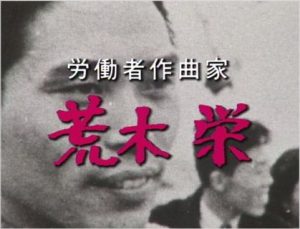
Title screen from film Araki Sakae the Laborer-Composer (1993)
Jun Hee Lee (PhD Candidate in History)
“In Chorus with Japanese Laborers: the Utagoe Movement and Araki Sakae the Laborer-Composer”
Friday, June 1st, 3:00pm-5:00pm in CEAS 319
Discussant: Alex Murphy (PhD Candidate in EALC)
Please join us Friday (6/1) from 3:00pm to 5:00pm as we host Jun Hee Lee (PhD Candidate in History). He will present a draft chapter from his dissertation, which he summarizes as follows:
The Utagoe movement arose, by official account, in 1948 in association with the Japanese Communist Party’s early postwar cultural policy. Utagoe quickly gained momentum in the mid-1950s as it acquired associate performing groups in workplaces across Japan. As Utagoe began aligning with labor and peace movements through the 1950s, one culturally and politically conscious laborer from northern Kyushu found his calling: Araki Sakae (1924-1962), a second-generation coal miner in Miike, the future site of a landmark labor dispute in postwar Japan. Araki would dedicate the last ten years of his life to Utagoe, partaking in the Miike coal miners’ strike between 1959 and 1960 with his own songs. This paper examines ways in which Utagoe has subsequently celebrated Araki Sakae as an ideal laborer-composer (rōdōsha sakkyokuka) figure who was at once an earnest, politically conscious laborer and a creative soul. By exploring specific manners in which Utagoe posited the Miike strike as a national struggle and established Araki and his songs as landmarks for Utagoe’s timeline, this paper demonstrates how Utagoe produced and maintained a narrative of continued struggle (tatakai) for “peace” and “independence” of Japan, while eschewing Araki’s own life trajectory predating his encounter with Utagoe in favor of emphasizing Utagoe’s and Araki’s joint confrontations with “American imperialism” and “monopoly capital”. Utagoe’s continued celebration of Araki today bespeaks the endurance of such perspective, in which continued struggles by Japanese laborers occupy a quintessential place.
The paper is available directly below, or at this link. If you have not received the password, or have questions about accessibility, please feel free to contact Helina Mazza-Hilway (mazzah@uchicago.edu) or Susan Su (susansu@uchicago.edu).
